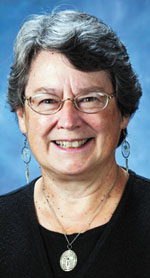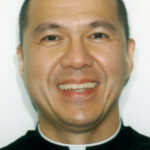By Corrine Winter
Recently, two students submitted essays in which they described having recovered from sports injuries. After recovering, each student maintained, they remained utterly certain that God was always there for them. Their experience, they thought, was a kind of resurrection experience, a return to happiness after a time of trial. There may be something to that comparison, as long as the happiness isn’t allowed to evaporate with the next trial.

The time after Easter with all the readings about Jesus appearing to his disciples may lead us to think we wish we had been there. We may picture the disciples experiencing a sudden conversion to confidence and overwhelming joy in their faith and never turning back. We might long to have such an experience ourselves — an irreversible turn to unwavering and joy-filled faith.
Sometimes stories of canonized saints are told as though once they made a decision to follow their vocation, they never doubted or really struggled with what they were about. Some novels and movies produced in the name of Christianity also portray conversion as a once-for-all event that produces an intense and lasting inner happiness so that the person is able to resist all future temptations.
It seems to me, however, that the Scriptures themselves suggest that the followers of Jesus experienced joy at the revelation of his resurrection while at the same time being challenged to accept a new level of responsibility in their relationship with Jesus, with his teaching and with one another. They are now to be the ones who “feed my sheep,” as Jesus is portrayed telling Peter. They will need to discern how to do that as well as how to bear witness to their experience of Christ. In the process of spreading the Good News, they will meet many to whom the stories they tell will seem made up and foolish, as Paul’s letter to the Corinthians suggests (see I Cor 15). It is in the midst of these challenges, faced together, that their joy will increase.
In saying all of this, I do not mean to deny the joy of the Easter season. Rather, I hope that we might find a deeper understanding of Easter joy as a kind of strength within on-going struggles, a willingness to accept new challenges even if we are not utterly certain of our capacity to do so. The joy and the mission it nourishes need to be sustained within a community of imperfect believers who are willing to discern together the best ways to live out our shared calling.
This deep abiding joy that leads us to address the many needs we find in our world today is, I believe, the kind of joy that Pope Francis described in his encyclical on the Joy of the Gospel, and which he exhibits in his ministry. In his many addresses, he hardly says that everything is perfect. Rather, believing that humanity is capable of doing better, he went so far on Palm Sunday as to condemn what he sees as indifference on the part of some to the plight of refugees. Furthermore, he reminds us frequently that we must recognize our own imperfections and let that awareness make us more accepting of others. So joy does not consist in self-satisfaction any more than in a belief that the world around us is exactly as it should be. Indeed, in the aforementioned encyclical, the pope contrasts the joy that comes from faith and prayer with the shallow kind of happiness with which a consumer mentality tempts us to seek instead.
Recently, we received news that Mother Teresa will be canonized in September. Some time after her death, reports spread that some of her journal entries revealed her own struggles in faith. The idea that she persevered in her widely admired works while wrestling with inner doubts increased my own admiration for her. No doubt prayer and her religious community as well as the clear needs of those she served were among the things that sustained her.
As we celebrate the events of Easter, may we find the joy that sends us forth in mission, willing to struggle together as we try to find the best way to approach the many challenges we see before us.
(Corinne Winter is a professor of theology at St. Ambrose University in Davenport.)











